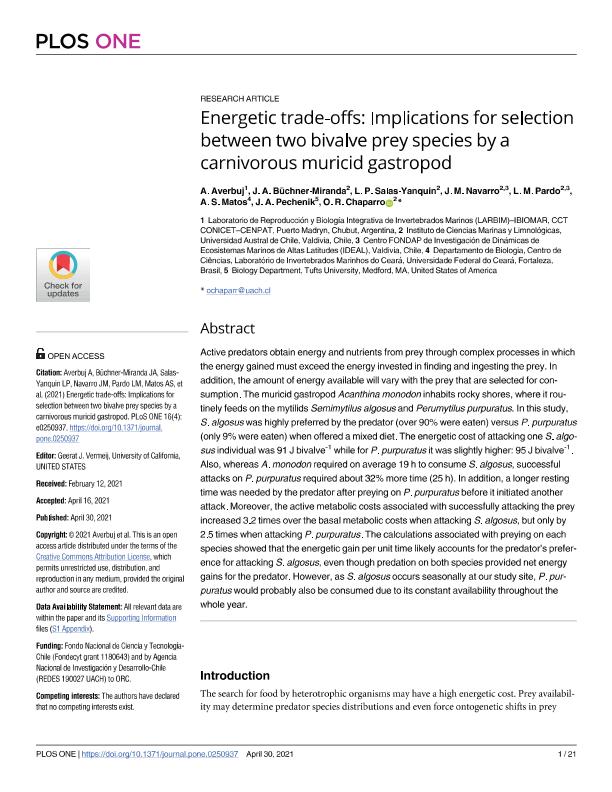Artículo
Energetic trade-offs: Implications for selection between two bivalve prey species by a carnivorous muricid gastropod
Averbuj, Andres ; Büchner-Miranda, J. A.; Salas-Yanquin, L. P.; Navarro, J. M.; Pardo, L. M.; Matos, A. S.; Pechenik, J. A.; Chaparro, O. R.
; Büchner-Miranda, J. A.; Salas-Yanquin, L. P.; Navarro, J. M.; Pardo, L. M.; Matos, A. S.; Pechenik, J. A.; Chaparro, O. R.
 ; Büchner-Miranda, J. A.; Salas-Yanquin, L. P.; Navarro, J. M.; Pardo, L. M.; Matos, A. S.; Pechenik, J. A.; Chaparro, O. R.
; Büchner-Miranda, J. A.; Salas-Yanquin, L. P.; Navarro, J. M.; Pardo, L. M.; Matos, A. S.; Pechenik, J. A.; Chaparro, O. R.
Fecha de publicación:
04/2021
Editorial:
Public Library of Science
Revista:
Plos One
e-ISSN:
1932-6203
Idioma:
Inglés
Tipo de recurso:
Artículo publicado
Clasificación temática:
Resumen
Active predators obtain energy and nutrients from prey through complex processes in which the energy gained must exceed the energy invested in finding and ingesting the prey. In addition, the amount of energy available will vary with the prey that are selected for consumption. The muricid gastropod Acanthina monodon inhabits rocky shores, where it routinely feeds on the mytilids Semimytilus algosus and Perumytilus purpuratus. In this study, S. algosus was highly preferred by the predator (over 90% were eaten) versus P. purpuratus (only 9% were eaten) when offered a mixed diet. The energetic cost of attacking one S. algosus individual was 91 J bivalve-1 while for P. purpuratus it was slightly higher: 95 J bivalve-1. Also, whereas A. monodon required on average 19 h to consume S. algosus, successful attacks on P. purpuratus required about 32% more time (25 h). In addition, a longer resting time was needed by the predator after preying on P. purpuratus before it initiated another attack. Moreover, the active metabolic costs associated with successfully attacking the prey increased 3.2 times over the basal metabolic costs when attacking S. algosus, but only by 2.5 times when attacking P. purpuratus. The calculations associated with preying on each species showed that the energetic gain per unit time likely accounts for the predator’s preference for attacking S. algosus, even though predation on both species provided net energy gains for the predator. However, as S. algosus occurs seasonally at our study site, P. purpuratus would probably also be consumed due to its constant availability throughout the whole year.
Palabras clave:
PREDATION
,
MUSSELS
,
ENERGETICS
,
MURICIDAE
Archivos asociados
Licencia
Identificadores
Colecciones
Articulos(IBIOMAR)
Articulos de INSTITUTO DE BIOLOGIA DE ORGANISMOS MARINOS
Articulos de INSTITUTO DE BIOLOGIA DE ORGANISMOS MARINOS
Citación
Averbuj, Andres; Büchner-Miranda, J. A.; Salas-Yanquin, L. P.; Navarro, J. M.; Pardo, L. M.; et al.; Energetic trade-offs: Implications for selection between two bivalve prey species by a carnivorous muricid gastropod; Public Library of Science; Plos One; 16; 4; 4-2021; 1-21
Compartir
Altmétricas



